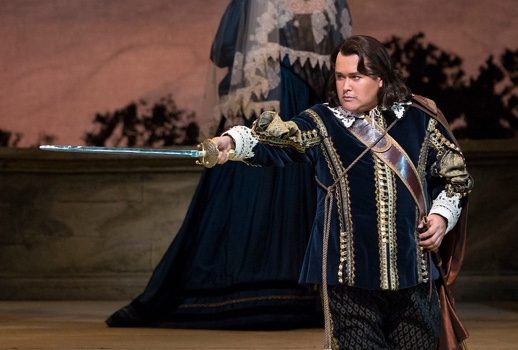

Honestly, the criticism seems a bit unfair, as Camarena’s singing was truly beautiful, even, and artfully phrased throughout the evening. Such uncompromising demands of singers—that they jump through difficult hoops, no matter the costs—reduce the art of singing to merely a sport, a feat of physical accomplishment.
While much can be argued about this approach to singing, this reductive lens erases the totality of an artist’s skills and talent, leaving little room for the more delicate and subtle ways in which a singer inhabits music. These concerns are more preoccupied with muscle than finesse, zeroing in on the physical limits of a voice, disregarding the manner in which that medium is used, and to what effect. Ultimately, it ignores the maxim that through the art of singing one embodies the essence of the material, revealing the composers intentions though the filter of one’s body and soul.
Indeed, it is this kind of vocal artistry that gives I Puritani much of its appeal, making it a rather ideal example of bel canto repertoire. The plot, with a libretto by Carlo Pepoli, is slightly boring in its conventional twists and turns. Set during the English Civil War between the Parliamentarians and the Royalists, the opera explores tensions between private longings and public duties to God and country.
A simple narrative provides ample opportunity for extended sequences of spectacular singing. And in the roles of Elvira and Arturo, Diana Damrau and Javier Camarena are skillful artists who fulfill the evening’s exacting demands.
Damrau, who recently rang in the New Year as Juliette in Gonoud’s Roméo et Juliette, was a sprightly Elvira, unwinding long lines of shimmering, well managed sound. Damrau, who is a bit like the Laura Linney of the operatic stage—elegant, technically proficient, and a tinge vanilla—perhaps lacks the bombast and spontaneity suggested by the role of a lunatic. However, her technical proficiency and bright enthusiasm brought a lovely vitality to her work.
Camarena’s pliant, luxurious tenor matched Damrau’s deftness. His eager and sincere persona served the role well. Even absent the high F, he displayed the artistry of a singer concerned with something more than the mere athletics of his role, a musician who uses his voice to invest his character emotionally.
In contrast to the romantic leads, Alexey Markov as Riccardo (Elvira’s intended) and Luca Pisaroni as Giorgio were competent, slightly bland and vocally unexciting. Their duet concluding Act II was especially devoid of dramatic momentum or musical radiance.
And as Enrichetta, Virginie Verrez’s round, thick mezzo was quite effective in the small, though memorable role. Her worldly, grim approach to the imperiled Queen served as a clean foil to the lighter, more girlish effervescence of Damrau’s Elivra.
Maurizio Benini’s conducting of the Metropolitan Opera Orchestra moved sloppily through the score, a disappointing juxtaposition against the unblemished performances on stage. And Sandro Sequi’s puritanically conservative production, created for Joan Sutherland and Luciano Pavarotti in 1976, is as static as doldrums, corralling most of the chorus upstage as they stare, shocked and concerned, at the individual actions occurring in front of them. Meanwhile, the opera’s leading characters spend most of their time crossing down stage right and down stage left, gesticulating wildly to indicate their internal struggles.
The sets and costumes by Ming Cho Lee and Peter J. Hall are picturesque, though remarkably void of any provocation. The interesting notions of private and public responsibility go largely without comment, forcing the audience’s focus to rest squarely on the efforts of the singers.
Fortunately, the evening’s drama shines through the two lead voices, where Damrau and Camarena reign supreme. Unlike many sports, the art of singing is a complex, multifaceted practice that requires singular qualities of the body and soul, a deeply sophisticated understanding of music, and the ability to negotiate limits with style and grace. Under such a definition, Damrau and Camarena perform their duties with exquisite finesse, heckled or otherwise.
Photo: Marty Sohl/Metropolitan Opera

























Comments